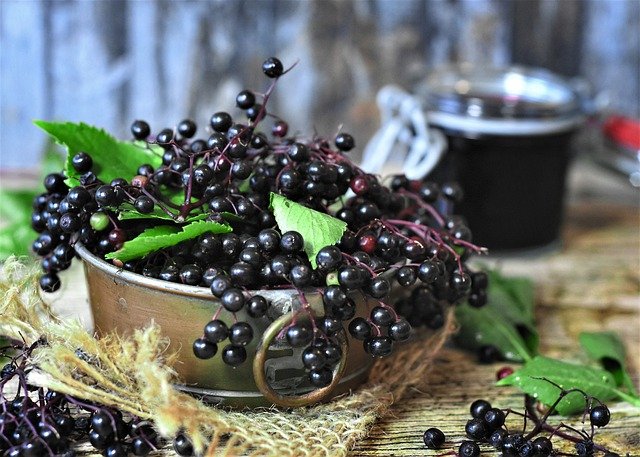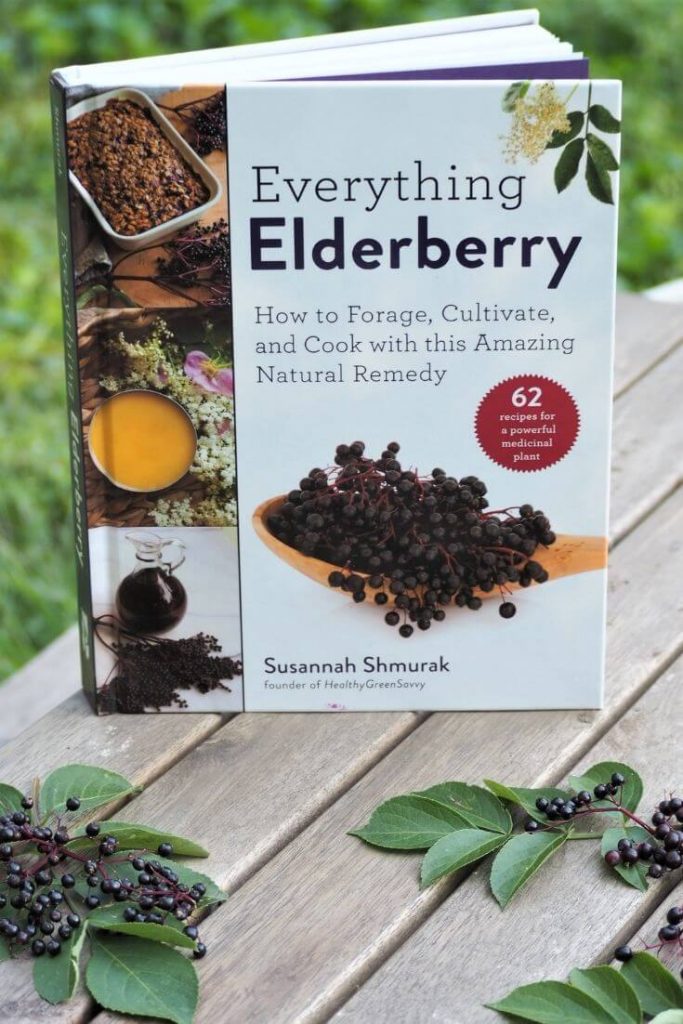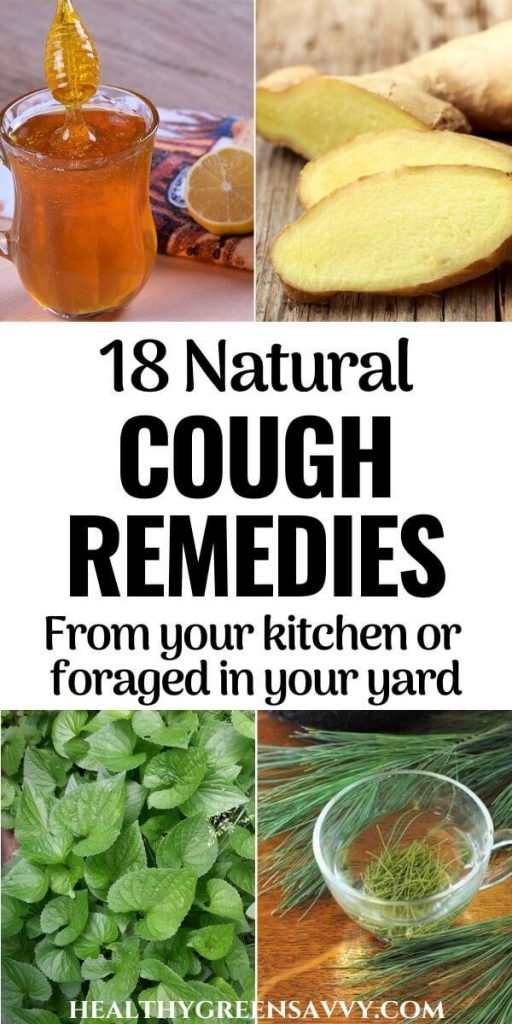Last Updated on February 14, 2024
Dealing with one of those annoying keep-you-up-at-night coughs? These simple at home remedies for cough can help you find some relief. Many cough relief ingredients can be found in most kitchens, while other natural cough remedies are herbs you can easily forage, grow, or purchase to help you make effective at home cough remedies like teas and syrups. Find out some of the best remedies for cough and stop coughing!
WHY CONSIDER USING A NATURAL COUGH REMEDY?
More of us are looking for ways to treat minor ailments at home, and having some simple natural remedies for cough in your toolkit can help when one of those annoying coughs strikes. While chemical-based cough medicines may stop your cough (though often they don’t, right?), most contain ingredients those of us wanting to live more naturally would rather avoid, like red #40, propylene glycol, and artificial flavors.
The American Academy of Pediatrics had enough concerns about common OTC cough medicine ingredients that they now advise against giving it to children. Plus, studies suggest that honey may work as well as or better than OTC cough medicines in clinical trials.
HOME REMEDIES FOR COUGH: WHAT CAUSES COUGHING?
A cough is your body’s response to something irritating your airways. Coughing expels excess mucus and pathogens from the lungs, so it’s not always something we want to suppress. Instead, we support our body’s efforts to get rid of these irritants by thinning the mucus to make it easier to expel.
Before treating a cough, it’s important to know what’s causing it.
If your cough is caused by allergies, addressing the irritant and our body’s response to it will be part of the strategy for controlling your cough. A good air purifier can remove airborne allergens, and natural remedies for seasonal allergies can alleviate the body’s response. If something like dust or other environmental irritants, an air purifier should help as well.
Most often, coughs are caused by viruses that either cause congestion or inflame the tissues in our throats or lungs.
Gastric reflux (also known as GERD) can also cause coughing, as can smoking and certain medications. If these issues are causing your cough, you need to address the underlying problem before your cough will resolve.
CHOOSING A NATURAL COUGH REMEDY ACCORDING TO TYPE OF COUGH
It’s important to distinguish between an acute and chronic cough. An acute cough lasts only a few weeks, while a chronic cough can persist for months and is often caused by an underlying condition like asthma. Experts recommend seeing a doctor if a cough continues for more than a few weeks.
Coughs are usually categorized as dry or wet. A dry cough doesn’t bring up any mucus, while a wet cough does. They’re also sometimes called “unproductive” or “productive” coughs. A productive cough produces mucus.
If your cough is caused by congestion, you want to use the remedies that help clear the congestion, called expectorants. Dry coughs may resolve more quickly if you soothe your throat with warm liquids and honey to allow the irritated tissues to heal.
Note that we don’t always want to suppress a cough. “Productive” coughs are trying to clear congestion out of our lungs, and some of the ingredients considered expectorants below can help with that process. However, at night, when coughing can keep us awake and prevent us from sleeping, some of the cough-suppressing ingredients below can help us get some badly-needed rest.
Which is the best remedy for cough? That may depend on what you have on hand, what you enjoy consuming, and how your body responds. Many of the cough remedies below are simply foods you likely already have in your kitchen, so if one doesn’t work well enough to relieve your cough, try another. Combining natural cough remedies (like ginger, orange peel, and honey) may also help. Lots of these home remedies for cough also support the immune system, so they’re good for fighting colds as well as simply relieving coughs.
BEST COUGH REMEDIES FROM THE KITCHEN
Warm Fluids
Warm fluids will help keep you hydrated and thin mucus while soothing a scratchy throat. Warm liquids help ease irritation, while adding certain herbs and kitchen ingredients may help alleviate cough. Consider sipping on some of the options below throughout the day to keep a cough under control.
Honey
Honey is a top recommendation for soothing a cough. You can take a spoonful straight or add it to one of the herbal teas below. I haven’t had fantastic success with lasting relief from honey alone, so using it in combination with some of the more powerful options below may bring greater relief from a troublesome cough.
Ginger
Many herbalists single out ginger as a top choice for numerous ailments, especially viral infections. Not only helpful for reducing inflammation and pain, ginger is an expectorant and considered helpful for cough. Try ginger tea on its own, or with orange peel (below) if you have a cough caused by congestion.
Starwest makes a tulsi ginger tea that adds the benefits of tulsi to your ginger tea.
Orange Peels
Orange peels are an often-overlooked (and thrown out!) home medicine, useful for all sorts of things. In addition to their cough-alleviating benefits, orange peels have anti-inflammatory and immune-supporting compounds. They’re considered most useful for wet coughs.
Next time you have an orange, save the peels and have a free home remedy for coughs at the ready.
Thyme
Thyme is not only a delicious culinary herb, it’s also a popular herbal remedy for coughs. Thyme is anti-spasmodic and expectorant, and a thyme tea may help soothe a cough. The flavor is pretty strong, though, so thyme may be more palatable added to your favorite broth than consumed straight. You can also combine thyme tea with lemon and honey. I grow a creeping thyme called lemon thyme that has a milder flavor and makes an excellent groundcover.
Pineapple Juice
A claim about pineapple juice’s ability to soothe a cough went viral on Facebook, but there’s no scientific evidence to back it up. Pineapple is a rich source of antioxidants, however, and contains bromelain, an anti-inflammatory that may help calm inflamed tissues, as well as other nutrients helpful for supporting immune function. If you try it, let me know if you found it helped.
Lemon
Lemon’s acidity is thought to help break up mucus, and is often combined with honey in tea to make a cough remedy that acts in numerous ways to soothe irritation and relieve a cough.
Chicken Soup
Long a favorite home remedy for colds, chicken soup contains compounds that have an anti-inflammatory effect and help with symptoms of colds. The hot liquid will help dispel mucus and soothe your throat. Add in some other cough-relieving ingredients like thyme or ginger and you have a recipe for less coughing.
Onion Syrup
An old folk remedy, a syrup made with onion for cough relief has a loyal following. If nothing else, the honey will soothe a cough, and the onion contains many beneficial compounds. If the flavor doesn’t appeal as a syrup, have a nice bowl of chicken soup with plenty of onion. Here’s a recipe for onion syrup from Growing Up Herbal.
Vinegar
Like lemon, vinegar’s acidity may help with a tickly sensation in your throat. Diluted in warm water with honey and ginger if desired, it may prove a useful natural cough remedy.
Sage
Sage soothes mucous membranes and is often recommended as a throat soother and natural cough remedy. Sage is worth trying as a tea (with honey and lemon for flavor and further soothing) or in a homemade honey-based syrup.
Oregano
An anti-inflammatory and antiviral herb, oregano is a traditional home remedy for cough. Like sage, it can be made into a tea, but it may go down better in a broth.
Turmeric
Turmeric is one of the top anti-inflammatory spices out there, and is often suggested for soothing inflamed airways. A somewhat bitter spice, you can add it to chai tea, soups, or a “golden milk” made with dairy alternatives like this one from the Minimalist Baker. Note that combining with black pepper significantly increases the bioavailability of turmeric. Here’s more on additional health benefits of turmeric.
NATURAL COUGH REMEDIES YOU CAN FORAGE EASILY
A surprising number of plants that grow in our yards have useful medicinal properties. Dry some during the growing season, and you’ll have them on hand when you need them. Many wild plants were used as natural cough remedies by Native Americans if you’d like to explore them here.
You can forage many natural cough remedies, but the ones below are especially easy to find and identify for the novice forager.
ALWAYS make sure to correctly identify a plant before foraging. Consult a good field guide before foraging any plant for the first time. Peterson’s Guide to Edible Wild Plants and John Kallas’s Edible Wild Plants are two of my favorites.
You might consider taking a foraging class, like the Herbal Academy’s online foraging course, which teaches plant identification and ethical wildcrafting practices.
Pine Needle Tea or Syrup
Pine needle tea is often recommended for coughs, or you can use pine needles to make a homemade cough syrup, like this pine needle syrup from Colleen at Grow Forage Cook Ferment. Colleen’s wonderful book, Healing Herbal Infusions, contains loads more natural remedies that can help you treat common ailments naturally.
Wild Violet
Wild violets have demulcent and expectorant properties and are a longstanding remedy for cough. Gather some leaves and dry them to have on hand the next time a cough strikes so you can have some soothing violet tea. Or try making this violet cough syrup from The Nerdy Farm Wife. Check out additional medicinal and culinary wild violet recipes.
Plantain
Plantain might be one of the most medicinally useful edible weeds growing in your yard. In addition to helping with skin irritation and bug bites, its demulcent leaves make a good addition to cough-relieving teas and syrups. Harvest plenty of plantain leaves in summer and allow them to dry, then keep in a jar until you need them for easy homemade cough remedies. Here’s more on the benefits of plantain from Herbal Academy.
Yarrow
Yarrow is an easy-to-find plant considered useful for relieving coughs and colds. Herbal Academy reports that
Yarrow has drying, astringent properties, which can be a great boon to those with sinus infections, wet coughs, and even sinus allergies. It helps to dry up and move excess mucus out of the respiratory system while reducing swelling in the tender membranes of the nose and throat.
Here’s more on yarrow benefits and how to use yarrow.
Ground Ivy
Ground ivy or creeping Charlie is a traditional remedy for coughs and respiratory ailments (as well as an astonishing number of other complaints). While it hasn’t been studied for effectiveness in relieving coughs, it’s so easy to find, it might be worth trying next time you’re treating a cough. Here’s what to know about creeping Charlie uses.
Elderberry
A traditional home remedy for cough, elderberry can help clear up respiratory problems while attacking the viruses that often cause it to help you recover more quickly. Elderberry syrup is often made with honey and other herbs helpful for coughs listed here. This homemade elderberry syrup contains several other ingredients to quell a cough and bolster the immune system. You can also make an unsweetened elderberry tea to cut down on how much sugar you consume. Here’s more on the benefits of elderberries.
If you love elderberries and want to better understand the science behind them as well as how to use them effectively in more than 60 delicious recipes, please check out my new book, Everything Elderberry!
Even if you can’t forage elderberries, you can buy them dried, a cost-effective way to DIY your elderberry syrup.
You might also consider growing your own. Here are the best elderberry varieties to consider.
There are numerous additional herbal cough remedies to consider adding to your herbal home apothecary, which I will cover in the next post on herbs for cough.
WHERE TO BUY HERBS AND SPICES FOR YOUR AT HOME REMEDIES FOR COUGH
When you start tapping into the healing powers of herbs and spices, you want to have plenty on hand for whipping up home remedies when you need them. I buy the spices I use often and in large quantities, like elderberries and cinnamon, by the pound from trusted sources like Mountain Rose Herbs or Starwest. Many herbs are sold in 4 oz quantities as well as by the pound. You can also find them on Etsy, Amazon, and other online retailers that carry herbs and spices.
I prefer to get those I use in smaller amounts, like cloves or nutmeg, in tiny quantities at my local natural foods store. They’re usually far cheaper than buying herbs in bottles, and you can buy only as much as you’ll use before they lose their potency.
OTHER NATURAL COUGH REMEDIES TO TRY
Some remedies for cough don’t involve food or drink, but alleviate congestion and irritation with physical remedies. Try them on their own or in conjunction with the remedies above.
Steam
A hot shower generating plenty of steam can go a long way to relieving a cough. I recommend using a quality shower filter so you’re not breathing lots of common water contaminants.
You can also create a steam tent with a bowl of hot water and a few drops of essential oils added that can help open airways, but be careful not to burn your skin on the hot water or vapors. Some of the recommended essential oils for adding to steam include peppermint, frankincense, and eucalyptus. Here’s more on getting started with essential oils here.
Once you have a few bottles of essential oils around, you’ll discover they’re useful for all sorts of things. Peppermint oil is one of my favorites. Besides helping a cough, its invigorating scent may improve memory, alleviate headaches, and give you an energy boost. It’s also a great pest repellent. Here are more uses for peppermint essential oil.
Humidity
Like a steamy shower, humidifying the air can help alleviate cough, especially if it’s heating season and the humidity in your home has dropped. Dry air tends to irritate a cough more than humid air. Add only as much humidity as you need, though, as too much humidity over time can lead to mold growth.
Salt Water Gargle
Gargling with salt water is a longstanding remedy for soothing a sore throat, which may help lessen the urge to cough. A 2005 study also found that gargling with salt water three times per day effectively prevented upper respiratory infections.
To make a salt water gargle, dissolve 1/4 to 1/2 teaspoon salt in 8 oz of warm water and gargle in the back of your throat as long as you can, then spit it out.
Chest Rub
While we can use many herbs and spices internally, some work externally as well. We’ve had great success quelling coughs in both kids and adults with Maty’s Vapor Rub, which contains eucalyptus and peppermint oils. You can also DIY a chest rub using essential oils. Find instructions (plus important precautions for children) for making homemade vapor rub from Mommypotamus here.
Need more ideas for natural ways to deal with coughs? Check out part 2 of the best remedies for cough, covering herbal cough remedies to consider adding to your home apothecary. If you love using herbs to support health naturally, here are some relaxing herbs and herbs for sleep to consider trying.
What remedies for cough have worked for you? Please share in the comments!
Pin to save these home remedies for cough for later!
Remedies for cough photo credits: RitaE, Gate 74, ExplorerBob, Protopian Pickle Jar, Anastasia Gepp, congerdesign, Susannah Shmurak
Disclaimer: I’m a health enthusiast, not a medical professional. Content on this website is intended for informational purposes only and is not meant to provide personalized medical advice. Please consult them for more information and a licensed professional for personalized recommendations.

Susannah is a proud garden geek and energy nerd who loves healthy food and natural remedies. Her work has appeared in Mother Earth Living, Ensia, Northern Gardener, Sierra, and on numerous websites. Her first book, Everything Elderberry, released in September 2020 and has been a #1 new release in holistic medicine, naturopathy, herb gardening, and other categories. Find out more and grab your copy here.










 Hi, I'm Susannah, a garden geek, energy nerd, and fan of healthy food and natural remedies. Need some simple, practical solutions for living healthier and greener? You've come to the right place! More about me and my green projects
Hi, I'm Susannah, a garden geek, energy nerd, and fan of healthy food and natural remedies. Need some simple, practical solutions for living healthier and greener? You've come to the right place! More about me and my green projects
Leave a Reply